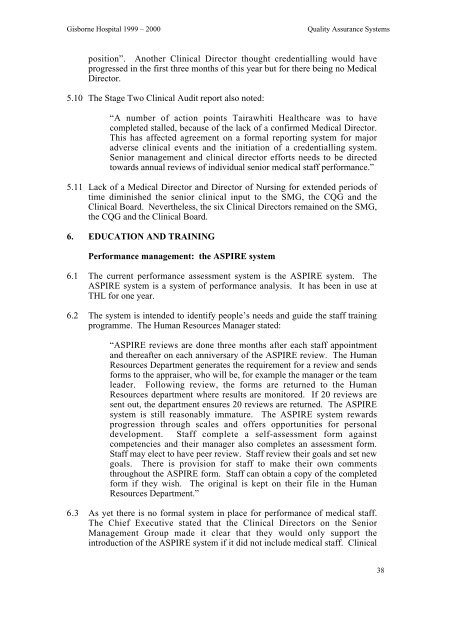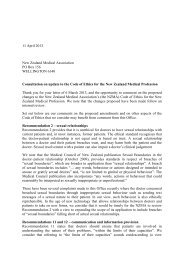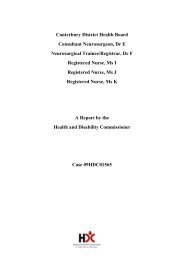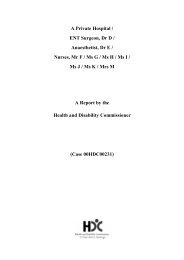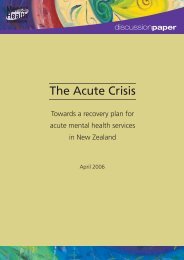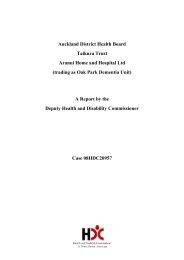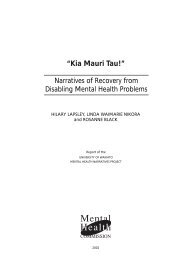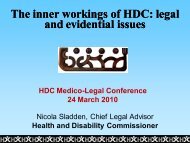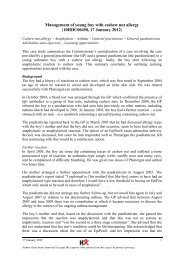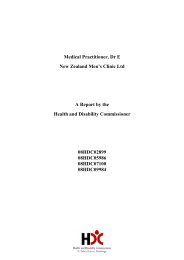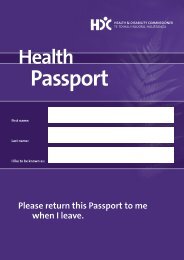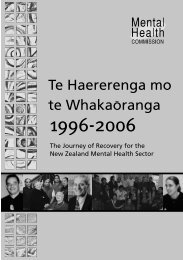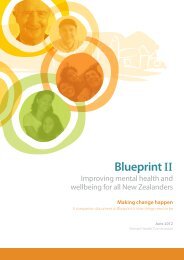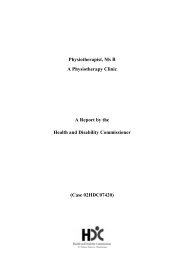Gisborne Hospital Report - Health and Disability Commissioner
Gisborne Hospital Report - Health and Disability Commissioner
Gisborne Hospital Report - Health and Disability Commissioner
Create successful ePaper yourself
Turn your PDF publications into a flip-book with our unique Google optimized e-Paper software.
<strong>Gisborne</strong> <strong>Hospital</strong> 1999 – 2000<br />
Quality Assurance Systems<br />
position”. Another Clinical Director thought credentialling would have<br />
progressed in the first three months of this year but for there being no Medical<br />
Director.<br />
5.10 The Stage Two Clinical Audit report also noted:<br />
“A number of action points Tairawhiti <strong>Health</strong>care was to have<br />
completed stalled, because of the lack of a confirmed Medical Director.<br />
This has affected agreement on a formal reporting system for major<br />
adverse clinical events <strong>and</strong> the initiation of a credentialling system.<br />
Senior management <strong>and</strong> clinical director efforts needs to be directed<br />
towards annual reviews of individual senior medical staff performance.”<br />
5.11 Lack of a Medical Director <strong>and</strong> Director of Nursing for extended periods of<br />
time diminished the senior clinical input to the SMG, the CQG <strong>and</strong> the<br />
Clinical Board. Nevertheless, the six Clinical Directors remained on the SMG,<br />
the CQG <strong>and</strong> the Clinical Board.<br />
6. EDUCATION AND TRAINING<br />
Performance management: the ASPIRE system<br />
6.1 The current performance assessment system is the ASPIRE system. The<br />
ASPIRE system is a system of performance analysis. It has been in use at<br />
THL for one year.<br />
6.2 The system is intended to identify people’s needs <strong>and</strong> guide the staff training<br />
programme. The Human Resources Manager stated:<br />
“ASPIRE reviews are done three months after each staff appointment<br />
<strong>and</strong> thereafter on each anniversary of the ASPIRE review. The Human<br />
Resources Department generates the requirement for a review <strong>and</strong> sends<br />
forms to the appraiser, who will be, for example the manager or the team<br />
leader. Following review, the forms are returned to the Human<br />
Resources department where results are monitored. If 20 reviews are<br />
sent out, the department ensures 20 reviews are returned. The ASPIRE<br />
system is still reasonably immature. The ASPIRE system rewards<br />
progression through scales <strong>and</strong> offers opportunities for personal<br />
development. Staff complete a self-assessment form against<br />
competencies <strong>and</strong> their manager also completes an assessment form.<br />
Staff may elect to have peer review. Staff review their goals <strong>and</strong> set new<br />
goals. There is provision for staff to make their own comments<br />
throughout the ASPIRE form. Staff can obtain a copy of the completed<br />
form if they wish. The original is kept on their file in the Human<br />
Resources Department.”<br />
6.3 As yet there is no formal system in place for performance of medical staff.<br />
The Chief Executive stated that the Clinical Directors on the Senior<br />
Management Group made it clear that they would only support the<br />
introduction of the ASPIRE system if it did not include medical staff. Clinical<br />
38


